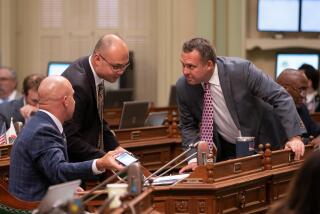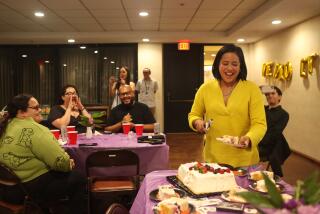Sailors’ Dollars, Filipinos’ Wages : For City Outside Subic Naval Base, There Was Only One Voting Issue
- Share via
OLONGAPO, Philippines — In the constitutional referendum that became a a test of President Corazon Aquino’s popularity, the voters of Olongapo had only to look down the street to see one of the few live issues.
This city of 240,000 was built from scratch on sailors’ dollars and Filipino wages, both paid out at adjacent Subic Bay Naval Base. A provision of the constitution puts the future of Subic and other American military installations in the Philippines in doubt.
According to unofficial returns, Olongapo voted for approval, seemingly putting the golden egg at peril. That was not the voters’ intention.
If a new base agreement was put to the voters of Olongapo, said Rolando Eclevia, executive secretary to acting Mayor Teodoro (Teddy) Macapagal, 80% would support it. The campaign for approval of the constitution was run out of Macapagal’s office.
A Different Opinion
Former Mayor Richard Gordon headed the opposition campaign here and took sharp issue Monday with Macapagal’s slogan of “Yes (on the constitution), for retention of the bases.”
“That’s a blatant lie,” Gordon declared heatedly. Gordon strongly supports the bases and says the issue should not have been included in the constitution.
The political struggle between the two men--who were teammates on the debate squad at the University of the Philippines but never friends, according to Gordon--has further muddied the issue here.
Decision in 1991
An immediate ban on bases was proposed by the leftist bloc on the constitution drafting commission last summer. It was watered down by Aquino’s supporters among the majority and now reads in part:
“After the expiration in 1991 of the agreement between the Republic of the Philippines and the United States of America concerning military bases, foreign military bases, troops, or facilities will not be allowed in the Philippines except under a treaty duly concurred in by the (Philippine) Senate and, when the Congress so requires, ratified by a majority of the votes cast by the people in a national referendum. . . .”
That language, hammered out by the writers of the constitution, means in effect that it is up to the president of the Philippines. Aquino has said she will retain the bases until 1991, then make her decision, which could be no.
The possibility is enough to worry American military leaders. There is no good alternative to the Philippine bases, they say, if the United States is to maintain a strong strategic position in the Western Pacific and Indian Ocean.
The Pentagon may have been heartened last month when a political opponent made public the tape of a purported September, 1986, telephone conversation between Aquino, then in the United States, and Joker Arroyo, her executive secretary, in Manila.
The subject was whether a related constitutional provision on nuclear issues could hamstring base operations. Arroyo and an Aquino aide traveling with the president reportedly talked about whether the nuclear provision could be sidetracked, since it would potentially inhibit U.S. use of the bases.
The interpretation was that Aquino favored retention of the bases. The opposition leaked the tape in an attempt to show that Aquino was meddling with the writing of the constitution, which she said she would not do.
Enrile’s Opposition
Former Defense Secretary Juan Ponce Enrile, who opposed the constitution, said on the eve of the referendum that its approval would mean that “no nuclear-powered or nuclear-armed vessel or airplanes carrying nuclear weapons will be able to enter the American military facilities in the Philippines”--a broad interpretation of the anti-nuclear provision. Since the United States will neither confirm nor deny that American planes and ships carry nuclear weapons, the implementation is debatable.
The debate over principle was largely lost in Olongapo, where the bases mean jobs and loose dollars in a rollicking strip of nightclubs and bars.
In its installations in the Philippines, the United States employs more than 42,000 Filipinos at wages far above the national average. The wages total more than $82 million and make up the second-largest payroll in the Philippines, topped only by that of the government itself.
Under the present agreement, the Reagan Administration has also pledged to seek $900 million in aid for the Philippines over five years. That makes the bases a major issue here in Olongapo, and except among leftist and certain nationalist groups, it diminishes with each mile traveled from the bases.
Vote for Aquino
The Olongapo vote for ratification of the constitution can best be explained as a vote for Aquino. But it is equally important in Olongapo politics.
If the margin of victory falls below 60%, it would jeopardize the chances of Macapagal, appointed as acting mayor, for election to the post in this summer’s local elections. Eclevia, Macapagal’s top aide, thinks Gordon will seek the office again. He was removed from office by Aquino as a member of ousted President Ferdinand E. Marcos’ political party.
Gordon told a reporter Monday that he is setting his political sights higher than mayor. As the man who cleaned up the lawless side of Olongapo and gained a reputation for independence within the Marcos party, he is a more likely candidate for the Senate.
A week ago, Gordon brought former Defense Minister Enrile to town to campaign against the constitution, drawing a crowd of more than 100,000, surpassing Macapagal’s best effort. Gordon’s father was also mayor here and was assassinated in office. The family remains highly popular with the electorate.
In the test of Aquino popularity and the struggle between Gordon and Macapagal and their positions on the bases, little else in the constitution was raised in the campaign here.
“I’m ashamed to tell you that (the base provision) was the only issue here,” Eclevia said.
More to Read
Sign up for Essential California
The most important California stories and recommendations in your inbox every morning.
You may occasionally receive promotional content from the Los Angeles Times.










